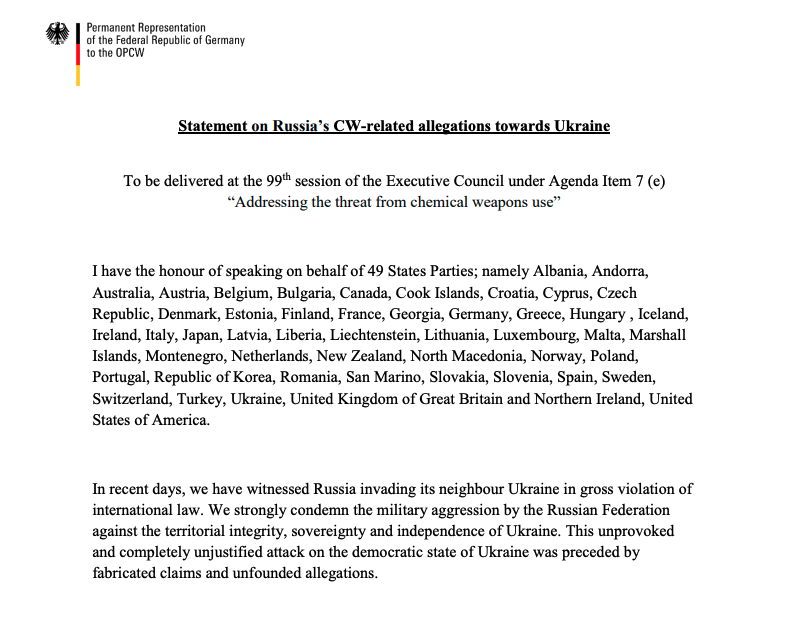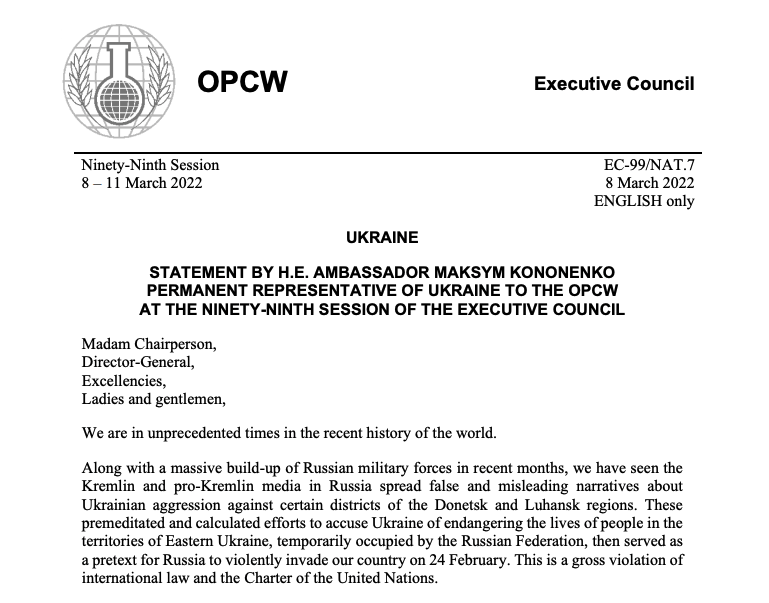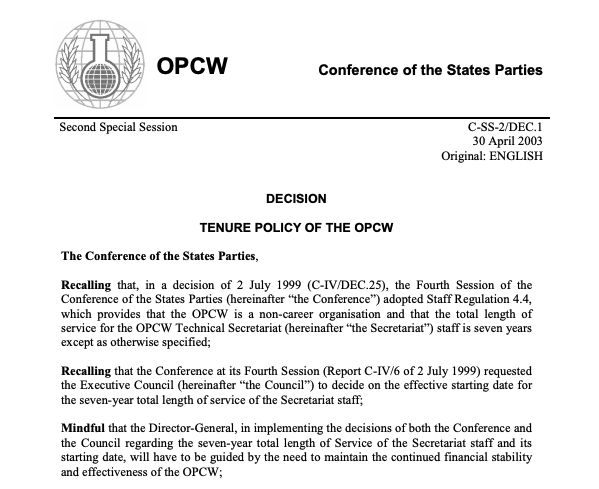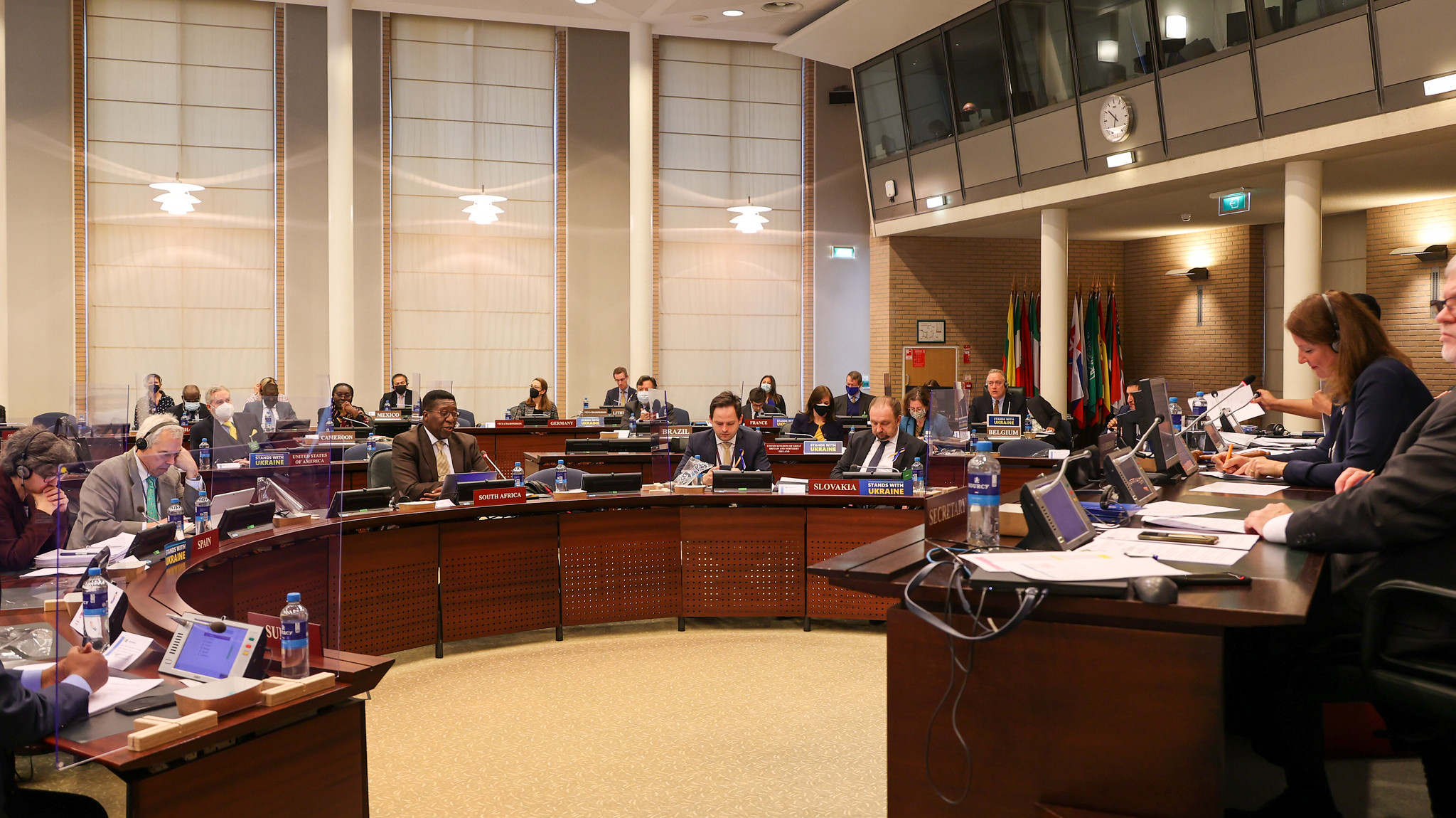Event and Conference Summaries
Summary Report
99th Executive Council Session
The 41-member Executive Council (EC) of the Organization for the Prohibition of Chemical Weapons (OPCW) convened in The Hague from March 8 to March 11, 2022, for the 99th Executive Council (EC-99) session. The Executive Council is responsible for promoting the effective implementation of and compliance with the Chemical Weapons Convention.
This summary report will cover:
- Descriptions and key quotes of the major thematic topics discussed within the national statements of Council member states
- Items of note, including: draft decisions, notes verbales, reports by the Director-General
Need a refresher on the OPCW, CWC, or Executive Council? Check out these short educational videos produced by the OPCW. The EC will typically meet 3 times annually with several additional special sessions.
Major Themes and Key Quotes
Please note: selected quotes are not necessarily representative of the views of the CWC Coalition or any of its members. Quotes are selected to highlight the diversity of opinions in the OPCW, and we try to find quotes that summarize the views of more than one country. Quotes will not always reflect all view points – they serve an educational purpose, but are not intended to give the reader a full understanding of all perspectives on each of these complex issues.
Russia's Invasion of Ukraine
Although Russia’s military attack on Ukraine is outside the scope of the Chemical Weapons Convention’s mandate, many nations took the time to address the situation in their national statements. Most nations condemned the ongoing attack and called on Russia to immediately stop all hostilities. Russia’s invasion of Ukraine began on Feb. 24, 2022.
“The Chemical Weapons Convention (CWC) is a pillar of the international disarmament structure and fortunately, it has not been directly affected by the Russian invasion of Ukraine. However, no responsible government and no States Party to the CWC can ignore the wider implications of a military aggression that illustrates a clear willingness to violate international law recklessly. It means for States Parties to the Convention that we have to protect international law and the CWC even more vigorously.” – Statement by H.E. Amb. Gudrun Lingner, Germany
False Chemical Weapons Allegations Against Ukraine and the US
In December 2021, Russian Defense Minister Sergei Shoigu claimed that American military contractors were smuggling “tanks with unidentified chemical components,” into Ukraine. Russia did not provide any evidence to back up this claim, and Washington and Ukraine both categorically denied the allegations. The transfer and use of chemical weapons are both strictly prohibited by the Chemical Weapons Convention.
“The false accusations by the Russian Federation of possession of unknown chemicals by Ukraine as mentioned among others by the Russian Defense Minister Sergey Shoigu in his statement in December last year are contradictory to the spirit of cooperation embodied in the Chemical Weapons Convention. The Czech Republic is deeply concerned by such unsubstantiated statements pointing at alleged violation of the Convention by one of its States Parties.” – Statement by H.E. Katerina Sequensová, Czech Republic
“In the lead-up to this war undertaken by the Russian Federation, some of its officials made allegations targeted at the United States, questioning our commitment to the Chemical Weapons Convention. Let me be clear in saying that these allegations are preposterous and our commitment to the Chemical Weapons Convention is iron-clad. We can see those allegations for what they truly are, and so often are from Russia – a means to distract from its transgressions and aggression.” – Statement by H.E. Amb. Joseph Manso, United States
"False Flag" Warning
In a note verbale distributed amongst the States Parties, Ukraine warned that Russia could be preparing to use chemical weapons in a “false flag” incident in order to justify continued violence. (Note: the document has not been published on the OPCW external server yet, but will be added to this document if/when it is published). The United States has also been warning that Russia could “possibly use chemical or biological weapons in Ukraine, or to create a false flag operation using them” for several months. The stockpiling or use of chemical weapons are both strictly prohibited by the Chemical Weapons Convention.
“The information provided by the Permanent Representation of Ukraine to the OPCW via the Note Verbale No. 61219/30-196/50-3 dated 27 February 2022, raises concerns that Russian armed forces may be preparing “false flag” provocations in Ukraine, using chemicals, including the explosion of industrial tanks filled with chemicals, involving the exposure of the population to dangerous chemicals. Such provocations or false accusations by Russia would be irresponsible and could have serious humanitarian consequences, not only for the Ukrainian population but also for the environment. In the event of such an incident, Russia alone would bear the responsibility.” – Statement by H.E. Mrs. Aiga Liepina, Latvia
Navalny & Novichok
During CSP-26, fifty-five member states produced a joint statement regarding the poisoning of Alexei Navalny in Russia. At he 98th Executive Council session (EC-98) in October, the UK and 44 other member states submitted four questions to Russia, asking Russia to explain what steps it has taken and what steps it plans to take to address and investigate the Navalny poisoning. There has been no progress in launching a Technical Assistance Visit to Russia to investigate the incident. During EC-99, many nations once again called on Russia to transparently comply with the OPCW to investigate the matter.
“Major questions remain around another violation of the Convention, the Novichok attack on Alexey Navalny, in Russia in August 2020. The Russian Federation has yet to carry out the required investigation for the use of a chemical weapon on its territory. It refused to cooperate with the Technical Secretariat (TS) on standard protocols for the deployment of a Technical Assistance Visit, and with its fellow States Parties in answering questions raised concerning this incident. We urge the Russian Federation to take action and ensure accountability for the use of a chemical weapon on its territory.” – Statement by H.E. Amb. Lisa Helfand, Canada
The OPCW's Fact Finding Mission
The Fact Finding Mission (FFM) was established by the OPCW in 2014 and is mandated to “study available information relating to allegations of use of chemical weapons in Syria, including information provided by the Syrian Arab Republic and others.” The FFM recently released two reports examining allegations of chemical weapons use in Kafr Zita and Marea. The reports concluded that industrial chlorine was used as a chemical weapon on Oct. 1, 2016, in Kafr Zeita, and that a blister agent was used on Sept. 1, 2015, in Marea. During EC-99, many nations expressed support for the FFM’s work.
“The two latest reports of the Fact Finding Mission (FFM) regarding the alleged use of chemical weapons in Syria once again draw disturbing conclusions. After a thorough, impartial and professional investigation, the FFM confirmed that the evaluation and analysis of all information available provides reasonable grounds to believe that toxic chemicals have been used as weapons both in Marea on 1 September 2015 as well as in Kafr Zeita on 1 October 2016.” – Statement by H.E. Heinz Walker-Nederkoorn, Switzerland
US Stockpile Elimination
Under its treaty obligations, the United States must finish destroying its chemical weapons stockpile by September 2023. Out of the 8 member states that declared chemical weapons stockpiles under the CWC, the United States is the last to finish stockpile destruction. Some nations called on the United States to complete destruction ahead of schedule.
“The United States remains steadfast in its commitment to destroy the remaining U.S. chemical weapons stockpile in Pueblo, Colorado, and Blue Grass, Kentucky. To further demonstrate its commitment to cooperation and transparency, the United States will host later this month a virtual U.S. Chemical Demilitarization Transparency Event for which regional groups’ delegates have been invited. We hope to host an in-person Executive Council Visit once public health and safety concerns improve.” – Statement by H.E. Amb. Joseph Manso, United States of America
Syria
At the second half of the 25th Conference of the States Parties (April 2021), the states parties voted to suspend Syria’s rights and privileges under the convention until it addresses 19 outstanding issues regarding its initial declaration of its chemical weapons stockpile and program. Syria’s rights and privileges will be reinstated once the Director-General reports that Syria has taken the necessary measures to come back into compliance. A Feb. 24 report by the Director-General confirmed that Syria has not completed any of the measures. Planning continues for a possible meeting between the OPCW and Syria’s Minister of Foreign Affairs, Mr. Faisal Mekdad.
“The Syrian regime has still not issued the necessary visas for the deployment of the Declaration Assessment Team (DAT) and continues to interfere in the choice of inspectors, making the deployment of the DAT impossible since last April. Madam Chair, This is not acceptable. We recall that Syria’s obligation to cooperate is enshrined both in Article VII paragraph 7 of the Convention to which Syria has acceded, and in Resolution 2118 (2013), which was unanimously adopted by the United Nations Security Council. It explicitly requires that immediate and unhindered access be provided to OPCW and UN personnel to all sites deemed relevant on Syrian territory.” – Statement by H.E. M. Luis Vassy, France
Abandoned Chemical Weapons
Japan has an obligation as an Abandoning State to complete the destruction of abandoned chemical weapons left on Chinese territory. According to China’s national statement at EC-97, Japan is set to complete destruction activities by the end of 2022. Many other countries also have abandoned and/or old chemical weapons, buried on land or dumped at sea, requiring eventual verified removal and remediation.
“Japan continues to undertake every effort for, and commits itself firmly to, the abandoned chemical weapon (ACW) destruction project in China. Japan, in fact, has collected approximately 90,000 items and completed the destruction of about 60,000 of them. Japan has already spent approximately 2.6 billion euros from its own account. […] Japan continues to stay in close communication with China including on the topic of the resumption of all destruction operations, as well as on how the current destruction plan should progress, of which the time frame will expire at the end of 2022.” – Statement by H.E. Amb. Horinouchi Hidehisa, Japan
Remote EC Meetings
As a result of the COVID-19 pandemic, Germany has been leading an effort to pass the “EC Business Continuity Initiative,” which aims to “define procedures that allow the Executive Council to convene when in-person meetings are not possible, using virtual meeting technology.” During EC-99, Germany appealed to all member states to support the initiative in order to achieve consensus.
“The Philippines supports the initiative to enable Executive Council meeting or session to take place in emergency situations to ensure continuity in the work of the OPCW. The COVID-19 pandemic has shown that, despite the challenges posed by situations that may limit how the usual work can be done, the Executive Council must be able to continue to discharge its duties and responsibilities. We also support other initiatives that are meant to ensure that the OPCW will have the resources and qualified staff to effectively discharge its mandate.” – Statement by H.E. Jose Eduardo Malaya III, Philippines
Items of Note

01. Joint Statement
On behalf of 49 States Parties, Germany read a statement condemning Russian disinformation about chemical weapons in Ukraine. The joint statement pushed back against the “unsubstantiated claims that Ukraine was preparing aggressive action in the Donbas region” and once again reiterated calls for Russia to investigate the use of a Novichok nerve agent on its territory.

02. Article 10
During Ukraine’s national statement, the Ukrainian representative warned that there was “a possibility of provocation, such as blowing up industrial tanks with chemicals,” and that “Russia would most likely accuse the Ukrainian military of this sabotage.” Ukraine made it clear that, should anything happen, it will invoke Article X of the Chemical Weapons Convention, which calls for the delivery of “Assistance and Protection Against Chemical Weapons.”

03. Tenure Policy
There are ongoing talks to amend the OPCW’s tenure policy, which currently caps employees of the Technical Secretariat staff at 7 years. Many countries expressed interest in continuing this conversation, and nations such as Ghana highlighted the importance of ensuring geographic balance within the workforce. Despite proposed drafts, no consensus has been reached.
